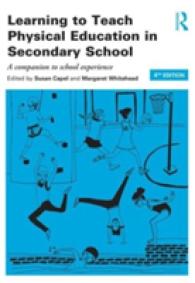Full Description
Primary education is one of the most important phases of learning but there remains a scarcity of in-depth research on this vital topic. However, as the focus on improving outcomes increases there is a growing interest internationally in research that helps us to understand the best ways to help young children engage with the curriculum in order that they may have the best possible life chances. This text helps to address these issues and consists of seminal articles derived from the forty-year history of the journal Education 3-13, which can claim to be one of the most important and influential publications in its field.
The chapters included have been chosen carefully to represent a wide range of key topics in research on primary education and the text is sub-divided into five sections, each of which has been edited by leading academics who specialise in the topic under scrutiny. The sections include:
• Learning and teaching, including the psychology and philosophy of primary education;
• Key challenges in primary education, including changes to the governance of schools, and educational management and leadership;
• The primary curriculum, including Maths, Science, IT and Technology Education;
• The primary curriculum, including English, Humanities and the Arts; and,
• Primary teachers' work and professionalism.
Many of the contributions are written by seminal figures in academic research. The text will be especially relevant to students and researchers engaged the study of primary education as well as to practitioners, advisers and policy makers and will prove an invaluable resource for those wishing to gain an overview of research into primary education. It is recommended especially for those who wish to understand the development of primary education and the many twists and turns in theory, practice and policy that have influenced its development over the period of a generation. Those who read the text will come across the origins of many of the ideas that continue to influence primary teaching today as well as very recent research on where we are now in this important subject area.
Contents
Introduction. Part 1 - Learning and teaching (including psychology and philosophy of primary education) Chapter 1: Discovery learning: a personal view, Education 3-13, 1, 1, 6-6 (1973). Chapter 2: I suppose learning your tables could help you get a job - children's views on the purpose of schools, Education 3-13, 14, 2, 41-46 (1986). Chapter 3: 'Memories are made of this': some reflections on outdoor learning and recall, Education 3-13, 35, 4, 333-348 (2007). Chapter 4: It is approaching breakfast and this is a campervan: weather, drawings and grandparenting in N.W. England, Education 3-13, 39, 2, 107-127 (2011). Part 2: Key challenges in primary education (including changes to governance, educational management and leadership) Chapter 5: Challenges to primary education, Education 3-13, 5: 2, 45-51 (1977). Chapter 6: Delegation: Burden or empowerment? Education 3-13, 30: 3, 35-41 (2002). Chapter 7: Planning for leadership succession: creating a talent pool in primary schools, Education 3-13, 34:3, 259-268 (2006). Chapter 8: Every Child Matters: 'tinkering' or 'reforming'—an analysis of the development of the Children Act (2004) from an educational perspective, Education 3-13, 35:3, 213-223 (2007). Part 3: The primary curriculum: Maths, Science, IT and Technology Education Chapter 9: Craft Design Technology in the primary school: Let's keep it primary, Education 3-13, 15:1, 11-20 (1987). Chapter 10: Who is a scientist? Children's drawings reveal all, Education 3-13, 20:2, 30-32 (1992). Chapter 11: Maths from a tube of smarties, Education 3-13, 23:1, 35-44 (1995). Chapter 12: Planning to use ICT in schools? Education 3-13, 29:1, 9-17 (2001). Chapter 13: 'Science is not my thing': primary teachers' concerns about challenging gifted pupils, Education 3-13, 34:1, 49-64 (2006). Part 4: The primary curriculum: English, Humanities and the Arts Chapter 14: Getting the message, Education 3-13, 5:2, 22-26 (1977). Chapter 15: Teaching young children about the past, Education 3-13, 7:2, 42-47 (1979). Chapter 16: The quality of writing 7 - 13, Education 3-13, 10:2, 10-35 (1982). Chapter 17: The arts in the primary school: snapshots of practice, Education 3-13, 20:1, 23-29 (1992). Chapter 18: Giants, good and bad: story at the heart of the curriculum at Key Stage 1, Education 3-13, 22:1, 44-54 (1994). Chapter 19: Growing towards citizenship, Education 3-13, 26:3, 3-8 (1998). Chapter 20: Picking a path through the phonics minefield, Education 3-13, 27:1, 12-21 (1999). Chapter 21: Arts education in the 21st century - frill or fundamental? Editorial, 28: 2, 2-8 (2000). Chapter 22: The National Literacy Strategy: missing a crucial link? A comparative study of the National Literacy Strategy and Success for all (SFA), Education 3-13, 34:1, 37-48 (2006). Chapter 23: International perspectives on history education, Education 3-13, 38: 3, 219-223 (2010). Part 5: Primary teachers' work and professionalism Chapter 24: The primary teacher as servant of the state, Education 3-13, 7:2, 18-23 (1979). Chapter 25: Teachers studying classroom learning, Education 3-13, 10:2, 30-35 (1982). Chapter 26: Educational reform and primary teachers' work: Some sources of conflict, Education 3-13, 24:2, 13-22 (1996). Chapter 27: Would schools improve if teachers cared less? Education 3-13, 25, 3, 11-22 (1997). Chapter 28: Doing school differently: creative practitioners at work, Education 3-13, 35:1, 47-58 (2007).








